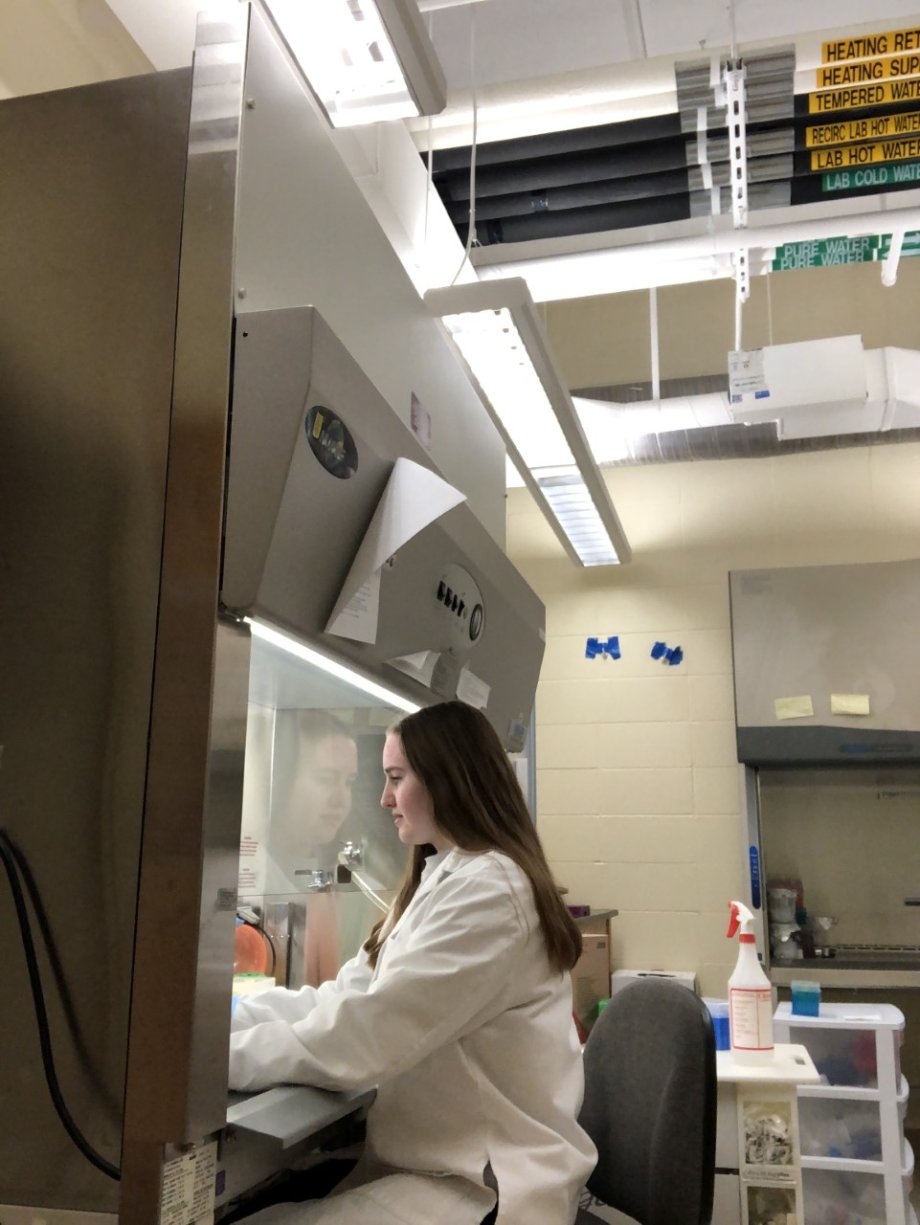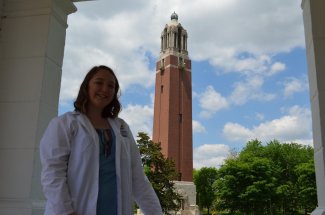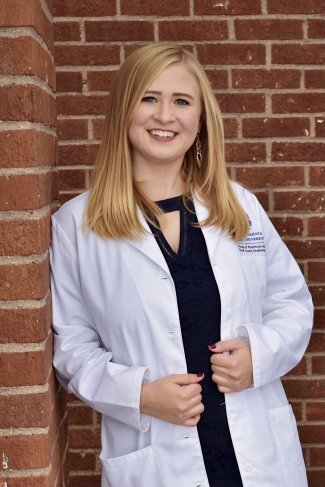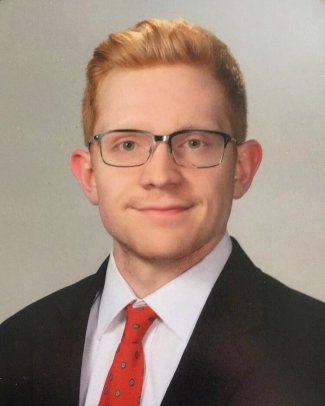
Working alongside a faculty member in a research setting may seem like a venue for graduate students, but plenty of undergraduate students have been willing to approach faculty.
One such student is Lisa Wipf, a freshman nursing student from Minnetonka, Minnesota, who joined the lab of Wenfeng An, the Markl Faculty Scholar in Cancer Research in the Department of Pharmaceutical Sciences.
“I got involved by emailing faculty to find someone who had opportunities for a freshman in their lab. I wanted to do research because I did some in high school and really liked it, so I wanted to continue in college,” Wipf said.
She spends three to six hours per week in the lab.
“I am culturing 3T3 mice embryo cells but I am soon transitioning to F9 mice embryo cells. I have performed cell transfection and reverse transfection but the goal is to do just reverse transfection with more DNA to look at the expression of genes with the F9 cells,” said Wipf, who clearly knows a lot more about mice embryos than the average freshman.
An’s lab focuses on the L1 portion of the human genome.
Long interspersed elements (LINE-1 or L-1) are common in mammalian genomes and replicate exclusively inside individual cells. Using mammalian cell cultures and transgenic mice as primary systems, the lab dissects mechanisms of L1 retrotransposition, especially host factors involved in genetic and epigenetic regulation of L1 activity.
It’s clearly been a learning experience for Wipf, but she isn’t earning any credits.
“I am just doing it for fun and for the experience. So far, I have really enjoyed how hands on the learning is and how much I have learned in such a short about of time. I am going into nursing so this will help me figure out the specific area of nursing that I want to go into. Now I have been thinking about getting an advanced degree in nursing focusing on research,” Wipf said.
Pays to read your email

Abigayle Blanchette, a P4 student from Marshall, Minnesota, got involved in a project with Aaron Hunt, director of the Master of Public Health program. The project aims to improve prevention and management of diabetes, heart disease and stroke. It is funded by a $500,000, five-year grant from the Centers for Disease Control and Prevention and the South Dakota Department of Health.
Blanchette responded to an email seeking student researchers.
“I had previously been looking for an opportunity to get more involved in research and this one was an opportunity I could not pass up,” she said.
Year one of the study involved asking standardized questions to patients, practitioners and third-party payers. By year three, which ended in May, services were launched with health-care partners to optimize service delivery by these partners. Year four involves analyzing data from these programs with adjustments to service delivery as needed.
Blanchette has been doing data collection, data analysis and presenting posters and writing manuscripts under the eye of Erin Miller, assistant professor in the Department of Allied and Population Health.
“I have presented two posters and helped create two posters. These posters have been presented at the annual meetings of the American Pharmacists Association and the American Public Health Association as well as it the SDSU College of Pharmacy and Allied Health Professions Fall 2021 Convocation,” where Blanchette won the best poster award.
“I feel that working with SDSU faculty and students has made me a well-rounded student and will contribute to my ability to be a pharmacist in the future.”
Honors college research and beyond

Alexa Vanden Hull, a P2 student from Sheldon, Iowa, also is working on the project to improve the prevention and management of diabetes, heart disease and stroke.
She got involved as a part of her independent study through the Van D. and Barbara B. Fishback Honors College, which requires a research project for graduation with honors college distinction.
“I had an interest in working with Dr. (Sharrel) Pinto and this project after she talked about her research in one of my classes. I felt like this research fit well with my interest in working as a community pharmacist in the future,” Vanden Hull said. Pinto is head of the Department of Allied and Population Health.
“My role is to collect stories from practicing community pharmacists about several different interventions they have made in patients with chronic disease states.”
She captures highlights successful clinical and social services pharmacists provided to greatly improve patient outcomes and quality of life. Submissions are reviewed monthly to identify key themes and lessons learned and disseminated in newsletters and videos, Vander Hull said.
“My professional goal is to become a hospital or community pharmacist in the Midwest. Having a role in this research project allows me to understand more about my future profession and learn from current professionals about how I can make an impact on my patients’ lives in my future career,” Vander Hull said.
In fact, she said she has enjoyed this hands-on experience so much that she plans to continue the project after her honors research is done.
Presented findings at ASHP meeting

Dustin Moon, a P4 student from Dakota Dunes, also was part of Fishback Honors College during his undergraduate days.
“I applied for a research mentor through the Student College of Clinical Pharmacy clinical research program. I was looking for a mentor to assist me with my honors independent study research project to graduate with honors college distinction,” Moon said.
That resulted in him being connected with Deidre Van Gilder, an associate professor in pharmacy practice who lives in Watertown. She got Moon in a project run out of Brown Clinic in Watertown to see if patients with chronic obstructive pulmonary disease were receiving the appropriate inhaler therapy.
Moon reviewed data from 30 patients, some of whom Moon himself tested for inhalation capacity. He then compared it with the type of inhaler the patient had been prescribed.
In the study done during the 2018-19 school year, two patients were found to be on an inappropriate inhaler based on their inhalation ability and the flow rate needed for the inhaler to work effectively. Therapeutic changes were recommended. Moon noted pharmacists can administer these tests and recommend changes to providers.
He also anonymously surveyed provider opinions at Brown Clinic on the use of the inhalation capacity test and found a 93% positive response rate.
Moon analyzed the results and completed his research poster and report during the 2019-20 school year with the findings presented at the American Society of Health System Pharmacists annual midyear meeting in December 2020 with fellow Pharm.D. student Elizabeth Emerson.
“I really enjoyed the opportunity to participate in a research project in ambulatory care, an area of pharmacy that I am interested in. I also enjoyed getting to work closely with Dr. Van Gilder since it can be challenging to build professional relationships with large classes of students in college. Finally, I liked that I had flexibility to make my research project my own as it progressed,” Moon said.
He added that because the research was an independent study, it was “relatively easy to work around my required classes.”
- Contact:
- Telephone number: 605-688-4538
Republishing
You may republish SDSU News Center articles for free, online or in print. Questions? Contact us at sdsu.news@sdstate.edu or 605-688-6161.

